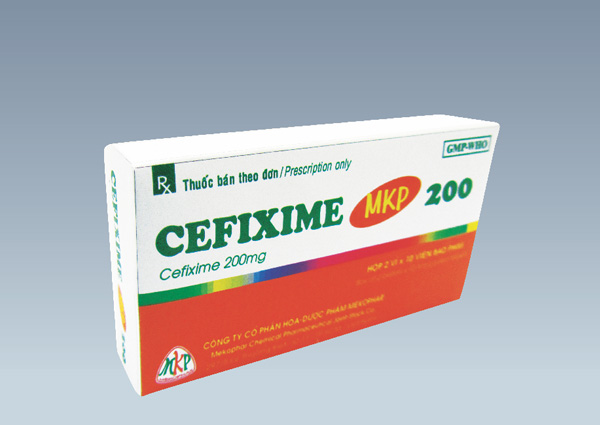Cefixim MKP 200
Indications
Treatment of wide variety of infections as the followings:
– Upper and lower respiratory tract: sinusitis, pharyngitis, pneumonia, bronchitis,…
– Genitourinary tract: gonorrhea, pyelitis,…
– Digestive tract: cholecystitis, typhoid.
– Skin and soft tissue.
Present
Blister of 10 film– coated tablets. Box of 2 blisters.
Composition
Cefixime trihydrate equivalent to Cefixime ………200mg
Excipients s.q. for ………………………………………….1 tablet
(Low– substituted hydroxypropyl cellulose, Colloidal silicon dioxide, Magnesium stearate, Sodium starch glycolate, Microcrystalline cellulose, Hypromellose, Povidone, Polyethylene glycol, Titanium dioxide, Polysorbate 80, Talc, Ethanol 96%).
Pharmacology
Cefixime is a semi– synthetic third– generation Cephalosporin antibacterial and is given by mouth in the treatment of susceptible infections. Its mode of action is bactericidal by inhibiting synthesis of the bacterial cell wall. It has broad spectrum and is active against most strains of Gr (– ) and Gr (+) bacteria. Gr (+) bacteria:
Streptococcus pneumonia, Streptococcus pyogenes. Gr (– ) bacteria:
Haemophilus influenzae (beta– lactamase producing or nonproducing), Moraxella catarrhalis (beta– lactamase producing), Escherichia coli, Proteus mirabilis, Neisseria gonorrhoeae (penicillinase producing or nonproducing).
Pharmacokinetics
Only 30 to 50% of an oral single dose of Cefixime is absorbed from the gastrointestinal tract. About 20% of an oral dose is excreted unchanged in the urine within 24 hours.
Contra-Indications
– Hypersensitivity to Cephalosporins, Penicillins or any ingredient of the medicine.
– Children under 6 months.
Side effect
– GI effects: frequent adverse effects are diarrhea, abdominal pain, nausea, vomiting, flatulence, anorexia, pseudomembranous colitis,…
– Nervous system effects: headache, dizziness, restlessness, insomnia, fatigue.
– Sensitivity reactions: rash, urticaria, drug fever.
Inform your doctor about side– effects when using this medicine.
Precaution
– Patients with renal impairment, including who are on renal hemodialysis.
– Patients with history of gastrointestinal disease and diseases of large intestine.
PREGNANCY & LACTATION:
– This drug should be used during pregnancy only when clearly needed.
– Caution should be exercised when this drug is administered to nursing mothers, discontinue breastfeeding during the therapy.
Interaction
– Probenecid increases peak concentration and AUC of Cefixime, decreases the renal clearance and distribution volume.
– Anticoagulant agents: increases time of prothrombin, with or without bleeding.
– Cefixime increases concentration of Carbamazepin in plasma.
– Nifedipin increases bioavailability of Cefixime.
OVERDOSAGE:
Should overdosage occur, turn to the nearest healthcare facility for medical attention of the healthcare professionals.
Shelf life
24 months from the manufacturing date. Never use after the expiry date clearly indicated on the outer packaging.
Storage
Store in dry place, not exceeding 30oC. Protect from light.
Dosage
The usual course is 7– to 14– day long.
– Adults: the usual dosage is 200 – 400mg daily, depending on the severity of infection. This may be given as a single dose or divided into two equal doses every 12 hrs.
– Children:
* Children > 12 years or those weighing more than 50kg: may receive the usual adult dosage of Cefixime.
* Children 6 months – 12 years: 8mg/kg daily, given as a single dose or divided into two equal doses every 12 hrs.
– Uncomplicated gonorrhea: a single 400mg oral dose.
– Renal impairment:
Because neither hemodialysis nor peritoneal dialysis remove significant amount of drug from the body, normal dose and schedule may be employed in such patients without adjustment.












Reviews
There are no reviews yet.